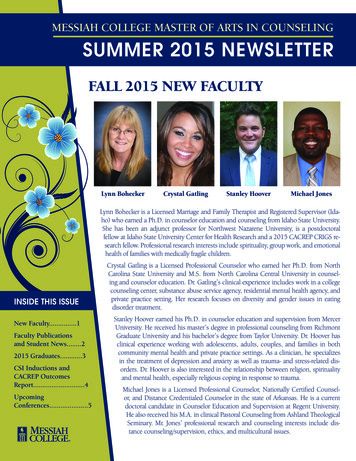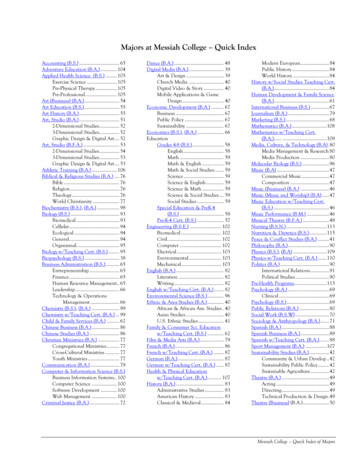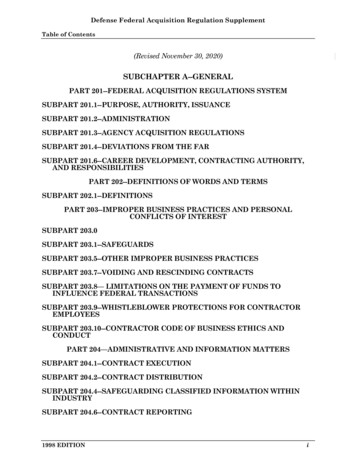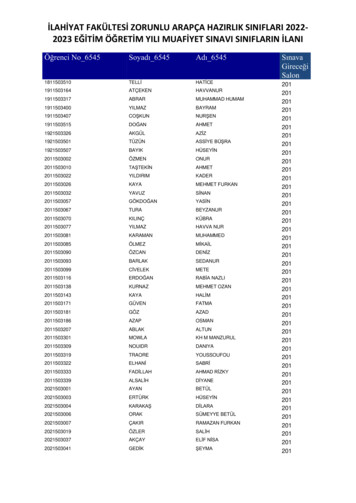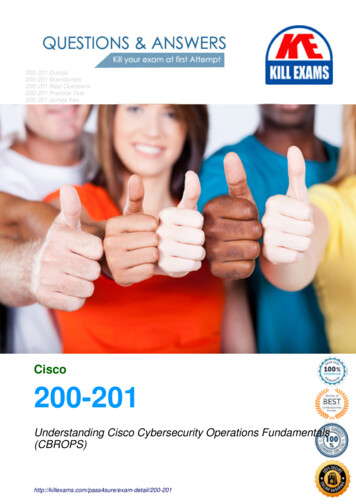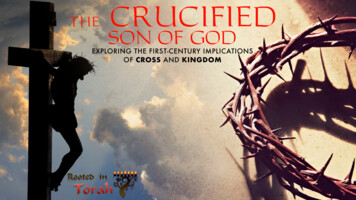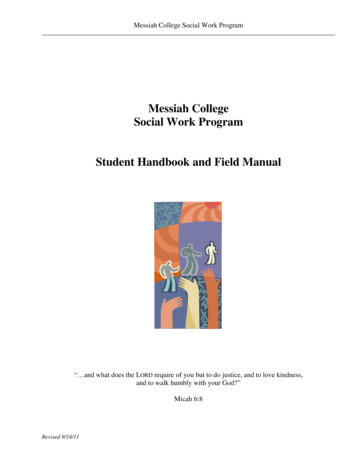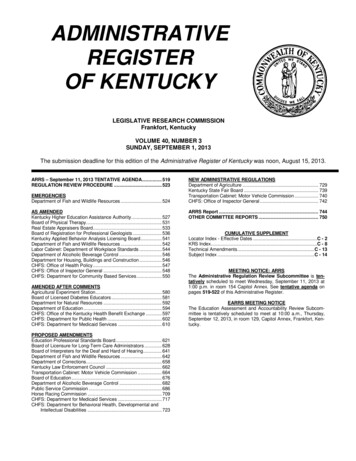
Transcription
GRADUATE PROGRAM IN EDUCATIONSTUDENT & ADVISING HANDBOOK2017-2018(Updated 07/21/17)
TABLE OF CONTENTSINTRODUCTION TO THE PROGRAM. 2Mission of Messiah College. 2Mission of the Graduate Program in Education . 2Design of the Graduate Program in Education . 3What We Offer: Master of Education degree in the following tracks . 3Non-degree Program Options--PDE Certification only . 3Messiah College Certificates . 3SAS and Inclusive Classroom Courses. . 4PA Act 48 Credits . 4Post-Baccalaureate Teacher Certification Options . 4Program Learning Objectives GLOs. 5Evaluation of Critical Competencies . 5ACADEMICS . 6Admission . 7Transfer Credits . 8Academic Advisors . 8Registration . 8Curriculum . 9Course Descriptions . 15Course Schedule . 22Advising Guides . 23E-Portfolio . 23Field Experiences . 24Comprehensive Exam . 24Completion of the Program. 251
Graduation Requirements . 25Pennsylvania Educator Certification Test (PECT) . 25Certification and Good Moral Character . 25ONLINE EDUCATION AT MESSIAH COLLEGE . 26GENERAL POLICIES . 26Academic Appeals . 26Academic Integrity. 26Professional Ethics and Standards . 27Student Membership . 27GOVERNANCE . 27Graduate Program in Education Committee . 27ADDITIONAL COSTS AND FEES . 28CONTACT INFORMATION . 29INTRODUCTION TO THE GRADUATE EDUCATION PROGRAMINTRODUCTIONThis handbook serves as a guide for students in the Graduate Program in Education at Messiah College.In addition to this document, students should also be familiar with the policies and requirements forgraduate students contained in the practicum and internship handbooks.MISSION OF MESSIAH COLLEGEMessiah College is a Christian college of the liberal and applied arts and sciences. The College iscommitted to an embracing evangelical spirit rooted in the Anabaptist, Pietist, and Wesleyan traditions ofthe Christian Church. Our mission is to educate men and women toward maturity of intellect, character,and Christian faith in preparation for lives of service, leadership, and reconciliation in church and society.MISSION OF THE EDUCATION PROGRAMThe Graduate Program in Education at Messiah College is designed to advance the fields of TeachingEnglish to Speakers of Other Languages (TESOL), Special Education, Online Instruction, and Curriculumand Instruction by developing leaders, practitioners, and collaborators whose growing commitment toreconciliation, justice, and the dignity of all people compels them to pursue excellence in theirprofessional understanding and practice.2
DESIGN OF THE EDUCATION PROGRAMThe Graduate Program in Education is designed for 1) those who have graduated from an accreditedundergraduate institution; 2) those who wish to become competent educators who are capable of workingwith a variety of learners in multiple settings; 3) those who wish to serve others in the learning process,develop their leadership abilities in the field of education, and seek to reconcile relationships within theeducation setting; 4) those who are interested in exploring how the Christian faith is related to theteaching profession; and 5) those who wish to be educated and prepared by experienced, Christian facultymembers.WHAT WE OFFERDegree: Master of EducationTen Tracks (choose one):i. Special Education with a PreK-8 Grade Teaching Certification (39 credits)ii. Special Education with a 7-12 Grade Teaching Certification (39 credits)iii. Special Education (already certified or not seeking teacher certification) (30 credits) Autism Spectrum Disorders Emotional and Behavioral Disorders Specific Learning Disabilitiesiv. TESOL with ESL Program Specialist Certification (37 credits)v. TESOL (33 credits)vi. Curriculum and Instruction (30 credits)vii. Curriculum and Instruction Online Teaching (30 credits)viii. Online Teaching (33 credits)ix. Special Education with Online Teaching (36 credits)x. TESOL with Online Teaching (39 credits)In addition to specialized coursework, students in these tracks will complete a thesis/research project intheir area of concentration and successfully complete a comprehensive exam prior to graduation.Non-Degreei.English as a Second Language (ESL) Program Specialist (PDE, K-12)** (16 credits)ii.Autism Spectrum Disorders (ASD) Endorsement (PDE, K-12) (12 credits)iii.Special Education Certification Only (PDE, PreK-8) (24 credits)iv.Special Education Certification Only (PDE, Grades 7-12) (24 credits)Messiah College Certificatesi.Messiah College Certificate in Teaching English to Speakers of Other Languages (TESOL) (12credits)ii.Messiah College Certificate in Autism Spectrum Disorders (ASD) (12 credits)iii.Messiah College Certificate in Bilingual Education and TESOL (15 credits)iv.Messiah College Certificate in SE with PDE Certification PreK-8 (24 credits)v.Messiah College Certificate in SE with PDE Certification 7-12 (24 credits)vi.Messiah College Certificate in Online ESOL Instruction (12 credits)vii.Messiah College Certificate in Online Instruction (12 credits)3
viii.ix.Messiah College Certificate in Online Special Education Instruction (12 credits)Messiah College Certificate in TESOL with Online Teaching (18 credits)Messiah College offers multiple courses that meet the PDE Standards and Aligned System (SAS) andInclusive Classrooms requirements.All courses are eligible for Act 48 Credits in Pennsylvania**Requires current Pennsylvania teacher certification in any content area or grade levelPost-Baccalaureate Teacher Certification OptionsThe Graduate Program in Education (GPE) at Messiah College currently offers four PennsylvaniaDepartment of Education (PDE) approved post-baccalaureate teacher certification programs. Our postbaccalaureate programs allow teachers who have already earned a bachelor’s degree and an initial teachercertification to add certified areas of expertise to their existing credentials.The post-baccalaureate certification options include PreK-8 Grade Special Education, Grades 7 to 12Special Education, K-12 English as a Second Language (ESL) Program Specialist Certification, andAutism Spectrum Disorder Endorsement.Students may choose to complete all of the coursework for the add-on certification in the GraduateProgram of Education at Messiah College or they may elect to transfer credits into the post-baccalaureateprogram. Students may transfer credits from undergraduate and/or graduate coursework as long as thecompleted courses meet the following criteria: They address PDE competencies required for the certification being sought.They are taken at an accredited Pennsylvania institution of higher education that is approved byPDE to offer the desired add-on certification.The course is taken within five years of the completion of the post-baccalaureate certificateprogram.The student earns a grade of B or higher in the course.All transfer courses must be approved by the GPE Program Director.To take advantage of the transfer credit option students must submit the course title, description, andobjectives for review and audit by the GPE program director to ensure that PDE certificationcompetencies have been met. In some instances, the course syllabus may also be required. Once theprogram director receives the course information an audit will be completed. Next the student will receivean individualized post-baccalaureate list of courses that must be completed in order to fulfill therequirements of their selected track of study and earned certification. Students that complete half or moreof their courses in the Graduate Program in Education at Messiah College will be eligible for a MessiahCollege Certificate. This makes the student eligible for financial aid.The post-baccalaureate program is a non-degree program, although many of the graduate credits willtransfer into one or more of the graduate degree programs.4
PROGRAM LEARNING OBJECTIVESGraduates of the program in Education will demonstrate the following capabilities:i) Leadership(1) Analyze, evaluate, and respond to current trends and issues in education.(2) Confront structural barriers that impede student learning.(3) Apply ethical principles to complex problem solving and decisionmaking.(4) Conduct quality research to address issues in student learning.(5) Recognize the broad vision of schools and their role in shaping schoolculture and practice.(6) Promote collective responsibility for the well-being and development of all learners.ii) Practice(1)(2)(3)(4)(5)(6)(7)(8)(9)(10)Locate, evaluate, and apply appropriate educational research.Reflect on current practice and adapt as needed.Apply relevant research-based learning theories to educational contexts.Differentiate instruction to promote learning for all students.Design instruction and assessment for in-person and virtual classrooms.Demonstrate appropriate use of technology to support student learning.Use quality assessment data to inform instructional practices.Analyze, critique, and develop effective curriculum.Assess, modify, and develop curriculum.Develop and apply varied assessment and instructional strategies firmlygrounded in theory, research, and practice.iii) Collaboration(1) Foster collaborative relationships among students, families, and educators to foster thewell-being of all learners.(2) Demonstrate intercultural competence.(3) Communicate effectively with a broad range of audiences.(4) Recognize the sociopolitical realities of schools and work to empower all studentsand families.(5) Prevent, manage, and resolve conflict within and between groups.(6) Build and maintain hospitable professional environmentsThese objectives are intentionally assessed throughout the program of study and through theComprehensive Exam.Evaluation of Critical CompetenciesThe Messiah College Graduate Program in Education is committed to ensuring that graduates are wellsuited for the professional demands, roles, and responsibilities of the teaching profession. In order to helpassess students’ preparation for this profession, we have two critical competencies that all students mustachieve throughout the program. These critical competencies provide the foundation for acquiring theprogram learning objectives.5
The two critical competencies are:1. Interpersonal and professional competence including:a. the student’s ability to relate to peers, faculty, professionals, the public, and individualsfrom diverse backgrounds or histories in an appropriate mannerb. the student’s ability to resolve problems or issues that interfere with professionaldevelopment or functioning in an appropriate mannerc. the student’s willingness to respond constructively to feedback from supervisors orprogram faculty.2. Self-awareness, self-reflection, and self-evaluation including:a. the student’s knowledge of the content and potential impact of one's own beliefs andvalues on peers, faculty, professionals, the public, and individuals from diversebackgrounds or historiesb. the student’s ability and willingness to explore issues that either interfere with theappropriate provision of care or impede professional development or functioning ineducational contexts.Students will assess their status regarding these competencies multiple times--from their application foradmission to their application for graduation, and throughout the program. Course instructors will alsoassess each student on these competencies. Advisors will complete competency forms that willaccompany the students’ applications for advancement and graduation. Finally, the Graduate EducationProgram Committee will review the assessments of these competencies along with the student’sapplication for graduation.ACADEMICSADMISSIONAdmission ProcessApplications are accepted and reviewed throughout the year on a rolling basis, therefore students mayapply for entry into the program at any point.Application materials can be found on the graduate programs website. As indicated on the application,materials should be uploaded online.Admission decisions will be made by the Graduate Program in Education Committee upon review of theapplication materials, interviews (when applicable), and other relevant information provided by thestudent. The decision to admit a student is based upon both quantitative and qualitative criteria that incombination lead the committee to believe that the applicant possesses 1) the academic background anddrive to successfully complete the program; 2) the potential to contribute positively to the field of specialeducation, Curriculum and Instruction, Online Teaching, or TESOL; and 3) the desire to grow personallyand professionally without impeding the progress of other students.6
Admission Requirements1. Bachelor’s or master’s degree from an accredited institution2. Completed application and 30 application fee (No application fee is required if applicant is a MessiahCollege alumnus.)3. Official transcripts from all colleges or universities attended. (The Graduate Program will secureMessiah College transcripts for all Messiah College graduates who sign the release included in thisapplication. Applicants are responsible for securing all other transcripts.)4. Cumulative GPA of 3.00 or above*5. General admission essay6. Two recommendations (professional and/or academic)*7. Resumé or Curriculum Vita*8. Certification: Copy of valid PA El. Ed. or Early Childhood Ed. certificate for Spec. Ed. with certification Copy of valid PA certificate in any area for TESOL with certification Master’s only tracks do not require certification Interested candidates with invalid (lapsed) certification, please inquire for details Interested candidates with out-of-state certification, please inquire for details Program includes courses that meet PDE requirements for conversion from Level I to LevelII certification9. Completion of at least one face-to-face interview (e.g. in person or via webcam, etc.) will be required.** This information is not required for applicants pursuing Act 48 credit, audit, or personal enrichment. Ifstudents complete courses for Act 48 credit or personal enrichment and later choose to pursue a degree,all of the above requirements are necessary for admission to the degree program.General EssayPlease describe how you have prepared for graduatework, your reason for applying for the GraduateProgram in Education, and how this program willhelp you meet your professional goals. (300-500words)Mission Statement for Master ofEducation ProgramThe Master of Education is designed toadvance the fields of TESOL, Curriculumand Instruction, Online Instruction, andSpecial Education by developing leaders,practitioners, and collaborators whosegrowing commitment to reconciliation,justice, and the dignity of all people compelsthem to pursue excellence in theirprofessional understanding and practice.As a result of the application process, applicants will be granted full or conditional admittance, or bedenied entry into the program. Students will be notified of their admission status in writing. Generally,7
students are expected to maintain continuous enrollment in the program throughout the fall and springsemesters.Transfer CreditsUp to 20 percent of the total number of credits required for the degree may be accepted as transfer creditsprovided:1. the credits were taken at a regionally accredited college or university2. the credits were completed at the graduate level3. a minimum grade of a B was earned for each course4. the credits were taken within the past seven years.The following courses are distinctive to the program and must be taken at Messiah College: EDME 503 Advanced Instructional Design and Assessment EDME 530 Special Education Internship and Seminar EDME 531 Special Education Thesis and Seminar EDME 541 Special Education Project and Seminar EDME 532 TESOL Internship and Seminar EDME 533 TESOL Thesis and Seminar EDME 543 TESOL Project and Seminar EDME 534 Curriculum and Instruction Thesis and Seminar EDME 544 Curriculum and Instruction Project and SeminarAcademic AdvisorsStudents who are granted admission to the Graduate Program in Education will be assigned an academicadvisor. This faculty member will assist students with their academic and professional goals and growth(e.g. course selection and preparation for advancement through the program).Academic advisors are charged with the responsibility of communicating with each of their advisees atleast once during each term in which the student is enrolled. However, it is ultimately the student’sresponsibility to keep their advisor informed of any changes in their student record information orcircumstances that may prohibit the student from staying on track with the required course work.RegistrationStudents admitted to the College formally register for classes through the academic advisement process.Prior to registration, students must ensure their accounts are up-to-date with the Business Office and theirhealth records file is current with the Engle Center for Counseling and Health Services. Any student notin compliance with these requirements will be blocked from registration.Students should make arrangements to communicate with their academic advisor prior to registration todiscuss course selections. Typically, registration materials are made available around April 1 for the latesummer and fall semesters, and around November 1 for the spring and early summer terms.8
DEGREE PROGRAM, M.Ed.CURRICULUMRequired Core Courses for all tracks (12 credits)1.2.3.4.EDME 502 Advanced Socio-Cultural Perspectives on Education# (3)EDME 505 Educational Leadership# (3)EDME/COUN 551 Effective Practices for Every Learner**†(3)EDME /HIED 580 Research Methods* (3)*Cross-list with M.A. in Higher Education**Cross-list with M.A. in Counseling Program†Satisfies 3 cr. of PDE requirement for SAS or Inclusive Classrooms#Student evaluationsSpecial Education with a PreK-8 Grade Teaching Certification (27 credits; 39 total)1.2.3.4.5.6.7.8.EDME 503 Advanced Instructional Design and Assessment† (3)EDME 504 Family and Community Partnerships#*** (3)EDME 525 Curriculum and Learning† (3)EDME 526 Low Incidence Populations with field experience (3)EDME 527 Positive Behavioral Support with field experience (3)EDME 528 Infants, Toddlers, and Families with field experience (3)EDME 529 High Incidence Populations with field experience†# (3)EDME 530 Special Education Internship and Seminar# (3)Choose one of the following (3):9. EDME 531 Special Education Thesis and Seminar (3)10. EDME 541 Special Education Project and Seminar (3)Special Education with a 7-12 Grade Teaching Certification (27 credits; 39 total)1.2.3.4.5.6.7.8.EDME 503 Advanced Instructional Design and Assessment† (3)EDME 504 Family and Community Partnerships#*** (3)EDME 525 Curriculum and Learning† (3)EDME 526 Low Incidence Populations with field experience (3)EDME 527 Positive Behavioral Support with field experience (3)EDME 529 High Incidence Populations with field experience†# (3)EDME 530 Special Education Internship and Seminar# (3)EDME 537 Transition and Secondary Special Education (3)Choose one of the following (3):9. EDME 531 Special Education Thesis and Seminar (3)10. EDME 541 Special Education Project and Seminar (3)9
Special Education without Certification (already certified or not seeking teacher certification) (18credits; 30 total)1.2.3.4.EDME 503 Advanced Instructional Design and Assessment† (3)EDME 504 Family and Community Partnerships#*** (3)EDME 525 Curriculum and Learning† (3)EDME 530 Special Education Internship and Seminar# (3)CONCENTRATIONS:5. Choose one (3)o EDME 522 Autism Spectrum Disorders** (3)o EDME 527 Positive Behavioral Support with field experience** (3)o EDME 529 High Incidence Populations with field experience†# (3)6. Choose one (3)o EDME 531 Special Education Thesis and Seminar (with focus in area of concentration) (3)o EDME 541 Special Education Project and Seminar (with focus in area of concentration) (3)TESOL with PA ESL Program Specialist Certification (PDE) (25 credits; 37 total)1.2.3.4.5.6.7.8.9.EDME 503 Advanced Instructional Design and Assessment† (3)EDME 504 Family and Community Partnerships#*** (3)EDME 518 Second Language Acquisition: Theories and Context (3)EDME 520 Applied Linguistics: Grammar and Phonology in TESOL (3)EDME 521 TESOL Methods and Assessment with field experience†# (3)EDME 525 Curriculum and Learning† (3)EDME 532 TESOL Internship and Seminar# (3)EDME 542 Equipping School Personnel to Meet the Needs of ELLs (1)Choose one (3)o EDME 533 TESOL Thesis and Seminar (3)o EDME 543 TESOL Project and Seminar (3)TESOL with TESOL Certificate (21 credits; 33 total)1. EDME 503 Advanced Instructional Design and Assessment† (3)2. EDME 518 Second Language Acquisition: Theories and Context (3)3. EDME 520 Applied Linguistics: Grammar and Phonology in TESOL (3)4. EDME 521 TESOL Methods and Assessment with field experience†# (3)5. EDME 525 Curriculum and Learning† (3)6. EDME 532 TESOL Internship and Seminar# (3)7. Choose one (3)o EDME 533 TESOL Thesis and Seminar (3)o EDME 543 TESOL Project and Seminar (3)10
Curriculum and Instruction (18 credits; 30 total)1.2.3.4.EDME 503 Advanced Instructional Design and Assessment† (3)EDME 504 Family and Community Partnerships#*** (3)EDME 525 Curriculum and Learning† (3)Choose two courses from the following options (6):o EDME 518 Second Language Acquisition: Theories and Context (3)o EDME 520 Applied Linguistics: Grammar and Phonology in TESOL (3)o EDME 521 TESOL Methods and Assessment with field experience (3)o EDME 522 Autism Spectrum Disorders (3)o EDME 526 Low Incidence Populations with field experience (3)o EDME 527 Positive Behavioral Support with field experience (3)o EDME 528 Infants, Toddlers, and Families with field experience (3)o EDME 529 High Incidence Populations with field experience†# (3)o EDME 536 Instructional Design and Assessment for Learners with Autism Spectrum Disorders(3)o EDME 552 Issues and Ethics in Online Teaching (3)o EDME 552 Online Teaching and Learning with Field Experience (3)5. Choose one (3)o EDME 534 Curriculum and Instruction Thesis and Seminar (3)o EDME 544 Curriculum and Instruction Project and Seminar (3)Curriculum and Instruction Online Teaching (18 credits; 30 total)1.2.3.4.5.6.EDME 503 Advanced Instructional Design and Assessment (3)EDME 504 Family and Community Partnerships (3)EDME 525 Curriculum and Learning (3)EDME 552 Issues and Ethics in Online Teaching (3)EDME 554 Online Teaching and Learning with Field Experience (3)Choose one (3)o EDME 534 Curriculum and Instruction Thesis and Seminar (3)o EDME 544 Curriculum and Instruction Project and Seminar (3)Online Teaching (21 credits; 33 total)1.2.3.4.5.6.7.EDME 503 Advanced Instructional Design and Assessment (3)EDME 504 Family and Community Partnerships (3)EDME 525 Curriculum and Learning (3)EDME 552 Issues and Ethics in Online Teaching (3)EDME 554 Online Teaching and Learning with Field Experience (3)EDME 560 Online Educational Leadership and Management (3)Choose one (3)o EDME 534 Curriculum and Instruction Thesis and Seminar (3)11
oEDME 544 Curriculum and Instruction Project and Seminar (3)Special Education with Online Teaching (24 credits; 36 total)1. EDME 503 Advanced Instructional Design and Assessment† (3)2. EDME 504 Family and Community Partnerships#*** (3)3. EDME 527 Positive Behavioral Support with field experience** (3)4. EDME 530 Special Education Internship and Seminar# (3)5. EDME 552 Issues and Ethics in Online Teaching (3)6. EDME 554 Online Teaching and Learning with Field Experience (3)7. Choose one (3)o EDME 522 Autism Spectrum Disorders** (3)o EDME 529 High Incidence Populations with field experience†# (3)8. Choose one (3)o EDME 531 Special Education Thesis and Seminar (with focus in area of concentration) (3)o EDME 541 Special Education Project and Seminar (with focus in area of concentration) (3)TESOL with Online Teaching (27 credits; 39 total)1. EDME 503 Advanced Instructional Design and Assessment† (3)2. EDME 518 Second Language Acquisition: Theories and Context (3)3. EDME 520 Applied Linguistics: Grammar and Phonology in TESOL (3)4. EDME 521 TESOL Methods and Assessment with field experience†# (3)5. EDME 525 Curriculum and Learning† (3)6. EDME 532 TESOL Internship and Seminar# (3)7. EDME 552 Issues and Ethics in Online Teaching (3)8. EDME 554 Online Teaching and Learning with Field Experience (3)9. Choose one (3)o EDME 533 TESOL Thesis and Seminar (3)o EDME 543 TESOL Project and Seminar (3)NON-DEGREE PROGAM OPTIONSPennsylvania Department of Education-Certification OnlyESL Program Specialist (PDE, K-12) (16 credits)**1.2.3.4.5.EDME 502 Advanced Socio-Cultural Perspectives on Education (3)EDME 518 Second Language Acquisition: Theories and Context (3)EDME 520 TESOL Applied Linguistics: Grammar and Phonology in TESOL (3)EDME 521 TESOL Methods and Assessment with field experience (3)EDME 532 TESOL Internship/Seminar (3)12
6. EDME 542 Equipping School Personnel to Meet the Needs of ELLs (1)Special Education Certification Only (PDE, PreK-8) (24 credits)Special Education certification is available to any teacher with an Instructional I or II certification in anyarea. Teachers should select the same grade band in special education as their initial certification.1.2.3.4.5.6.7.8.EDME 503 Advanced Instructional Design and Assessment (3)EDME 504 Family and Community Partnerships (3)EDME 526 Low Incidence Populations with field experience (3)EDME 527 Positive Behavioral Support with field experience (3)EDME 528 Infants, Toddlers, and Families with field experience (3)EDME 529 High Incidence Populations with field experience†# (3)EDME 530 Special Education Internship and Seminar (3)EDME/COUN 551 Effective Practices for Every Learner (3)Special Education Certification Only (PDE, 7-12) (24 credits)Special Education certification is available to any teacher with an Instructional I or II certification in anyarea. Teachers should select the same grade band in special education as their initial certification.1.
Special Education, K -12 English as a Second Language (ESL) Program Specialist Certification, and Autism Spectrum Disorder Endorsement. Students may choose to complete all of the coursework for the add-on certification in the Graduate Program of Education at Messiah College or they may elect to transfer credits into the post-baccalaureate program.
